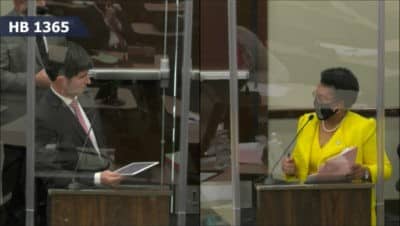
Indiana lawmakers continued Thursday to debate how to best hold state elections after a presidential election cycle coincided with the COVID-19 pandemic in 2020.
The overlap of the last election and a contagious virus prompted many questions about how to balance voter access with public health. For Indiana’s delayed primary last June, members of the bipartisan Indiana Election Commission decided voters should be able to vote by mail for any reason to avoid the polls and potential exposure to COVID-19.
But for the general election, the same commission chose on a party-line vote not to extend no-excuse mail-in voting, making Indiana only one of four states to require voters to provide a reason for voting absentee and prompting lawsuits from advocates. Indiana Secretary of State Connie Lawson and Gov. Eric Holcomb also advocated for people voting in person if possible, standing by public health measures already in place and the reality Indiana was no longer under the stay-at-home order issued at the start of the pandemic.
How is this conversation playing out in the 2021 legislative session? On Thursday, lawmakers in the Indiana House debated for nearly two hours on no fewer than 14 proposed amendments, all from Democrats, to two election bills. The amendments ranged from permanently allowing no-excuse absentee voting to expanding vote centers to allow for more early voting.
All were voted down by the Republican supermajority, though, with leaders in the party voicing support for the work already done to expand voter access through existing early voting opportunities.
Some of the amendments, including the one for no-excuse absentee voting from Rep. Tonya Pfaff, D-Terre Haute, and another from Rep. Matt Pierce, D-Bloomington, for Indiana to join the National Popular Vote Interstate Compact — an agreement among a group of U.S. states and the District of Columbia to award all their electoral votes to whichever presidential candidate wins the national popular vote — had been voted down along party lines earlier this week by the House Elections Committee chaired by Rep. Tim Wesco, R-Osceola.
Asked about the Democratic amendments in a post-session media avialability, House Speaker Todd Huston, R-Fishers, reiterated that the two election bills debated Thursday, both authored by Wesco, already provided for an expansion of early voting in Indiana as well as other improvements in voter access.
“I feel like Chairman Wesco and the committee are in a good spot,” Huston said. “You did see differences today among different counties and how they administered elections. I think that will be an aspect for us to learn from in 2022 and 2023, 2024 and beyond. But I feel comfortable with where we are.”
Read on for a round-up of some of the bills targeting how elections are managed in Indiana.
Voter Registration and Education
Voters in Indiana can currently register online, but they must do so with a valid photo ID like a driver’s license and complete applications at least 29 days before the election.
Several lawmakers, mostly Democrats, want to see the voter registration process change with:
Other legislators want to help improve voter education and awareness, proposing the following bills:
Early Voting and Vote Centers
An increasing number of counties are allowing early in-person voting across Indiana. But the process can still be limited by days, hours and locations. Some lawmakers want to offer more options with:
A growing number of Indiana counties have become vote center counties in recent years, allowing voters to cast a ballot at any polling location rather than at an assigned precinct. Republicans are leading the effort this session to require vote center counties to establish at least one vote center in each municipality in the county, a provision offered by the identical Senate Bill 58 and House Bill 1226.
Absentee Voting
Indiana is one of a handful of states that requires voters to have a reason to vote by mail, such as being over the age of 65, out of town on Election Day or busy at work during poll hours. Some proposed bills this session would change that while others clarify what absentee voting should look like after a record number of voters opted for it in the 2020 election:
Ranked Choice Voting and Independent Candidates
House Bill 1216 by Rep. Sue Errington, D-Muncie, suggests bringing a system to Indiana that’s only used by a handful of states today: ranked-choice voting.
While the bill would only allow ranked choice voting, which allows voters to choose multiple candidates by ranking them in order of preference, in municipal, county and school district elections, it’s a drastic departure from the traditional system of voting. The bill has not been heard by the House Elections Committee.
A separate bill takes a closer look at candidates running outside the two-party system. House Bill 1134, authored by Rep. Ethan Manning, R-Denver, requires candidates who receive between 2% and 10% of the vote in the secretary of state race to collect at least 4,500 signatures—500 from each Congressional district—to make it to the general election ballot and run for the governor’s office or U.S. Senate.
Political analysts criticized the bill in an article from The Indianapolis Star for narrowly targeting Libertarians, who saw new success with 2020 gubernatorial candidate Donald Rainwater. Rainwater ultimately lost to Republican Gov. Eric Holcomb but saw support in the double digits from voters.
HB 1134 was removed from the House calendar without discussion, so it is unlikely to receive a vote.
Erica Irish and Alexa Shrake are reporters for TheStatehouseFile.com, a news website powered by Franklin College journalism students.